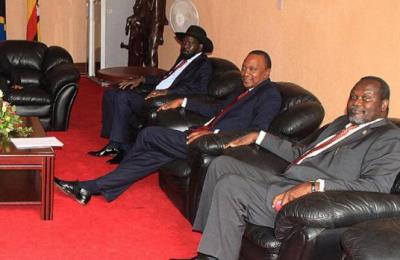South Sudan’s top rivals set to resolve contentious issues as pressure mounts
By Tesfa-Alem Tekle
March 2, 2015 (ADDIS ABABA) – Top rival leaders in the South Sudanese conflict are set for direct negotiations in Addis Ababa on Tuesday to resolve many outstanding issues and sign a final peace agreement as 5 March deadline fast approaches.

South Sudan’s president, Salva Kiir, on Monday arrived in Addis Ababa after changing his previous stance not to so as to hold direct peace talks with his former deputy Machar who has been waiting for the last two weeks.
The two rival leaders are expected to separately meet the Ethiopian prime minister, Hailemariam Desalegn earlier on Tuesday before they begin face to face talks, government sources told Sudan Tribune.
IGAD chief mediator, Seyoum Mesfin, on Monday said Kiir and Machar will be asked to discuss on three main issues.
According to Mesfin, the structure of the government particularly in the top level, power sharing ratios in the cabinet and in the national Assembly as well as the status of the army during the 30-month long interim period are areas for the two principals to resolve.
The two warring SPLM factions resumed phase three final session of the IGAD-led peace negotiations on 23 February to reach a final agreement by Thursday, 5 March deadline imposed by the mediators.
Members of rebel groups told Sudan Tribune that although talks saw little progress, however there are still critical issues hindering the peace process.
One of the contentious issues which needs to be resolved, they said, was on the structure of the army during the transitional period as the opposition faction wanted two separate armies during the interim period.
“We want the two armies to remain under separate commands while a process of gradual amalgamation shall be worked out during the transitional period,” said Machar’s spokesman, James Gatdet Dak, on Monday.
He said this was an important confident building measure that would help in successful implementation of the agreement.
Dak also said the government admitted up to 70% of the regular army had defected to the SPLM-IO for the last one year, saying it was illogical for the government to reintegrate the 70% into the remaining 30%, but to amalgamate.
“This implies that Salva Kiir commands only 30% of the regular SPLA while Dr. Riek Machar commands 70% of the SPLA. They should therefore be amalgamated gradually unit by unit as equals,” he said.
He said implementation of federal system and reforms during the transitional period were sticking points as well as government wanted it delayed or deferred for further consideration.
The government also wants unconditional reintegration of only rebel soldiers who were part of the regular army before the war broke out and rejected to include the White Army and new recruits, although both sides have recruited new members and militia groups.
The two sides have not also agreed on financial issues including on how to share revenues from the country’s oil wealth and disclosure of national debts.
Debates between representatives of the government and the SPLM-in opposition have also continued to finalize power-sharing issues.
The rebels have insisted on equal power sharing with the government.
The two conflicting parties are given until 5 March to bridge their differences and ink a comprehensive peace agreement to end the nearly 15-month-long conflict in the world’s youngest nation.
Under an agreement signed last month, a transitional government will be formed no later than 9 July.
US CALLS ON LEADERS TO SEAL DEAL
Meanwhile the US secretary of state, John Kerry, issued a strong worded statement on Monday calling on the warring parties in South Sudan to “seize the current and final round of negotiations to deliver a sustainable peace.”
He called on the warring parties to conclude a peace agreement and alleviate the suffering of their people.
“We are well past the point where enough is enough. Leaders must put the interests of their people above their own. The violence must end. A negotiated conclusion to this conflict is required now,” Kerry said in the statement.
He slammed president Salva Kiir’s government in Juba for dwelling on claims of legitimacy, saying it had neglected its responsibilities.
“Legitimacy is not a presumed right of any government. It is conferred by the people, and it is sustained only by demonstrating leadership to protect and serve all citizens – responsibilities the government has neglected,” he said.
He also slammed the opposition faction led by Machar for not making “the hard choices required of leaders.”
Both President Kiir and Machar, he said, had promised time and again that they would negotiate a transitional government under the Intergovernmental Authority on Development (IGAD) process, but have failed to make the compromises needed.
Kerry said the world was watching to see what the leaders of South Sudan would do as IGAD had outlined the way forward to a transitional government and necessary reforms.
“The parties have until March 5 to secure an agreement that is inclusive, that initiates a broad range of transitional reforms and that ensures those responsible for human rights abuses are held to account,” he said.
He added the United States will work with our international partners, including in the region, the UN Security Council (UNSC) and beyond, to take further concerted action against those who do not demonstrate a willingness to make the difficult decisions needed for peace.
The African Union (AU) and the international community have also warned the two South Sudanese leaders with sanctions if they failed to strike a final peace deal.
Sanctions to be imposed include travel ban, asset freeze and arms embargo.
Tens of thousands of people have been killed and nearly two million others forced out of their homes since the conflict erupted in December 2013.
(ST)
